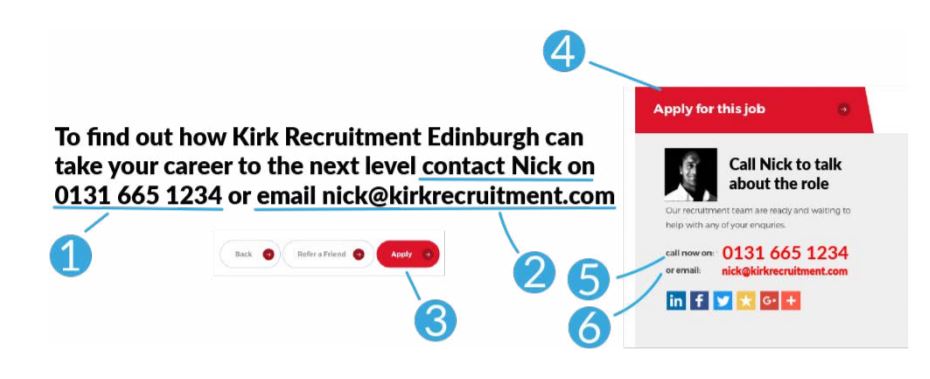A great candidate experience isn’t just key to making a single placement, it’s what secures the road to future placements too. And what’s more, news of a bad candidate experience travels fast! So how do you stay in your candidates’ good books and keep a reputation as a top class recruiter?
We’ve got a few simple but effective tips that will ensure your candidates are kept happy throughout the entire recruitment processes, and get you more jobs on a result!
1. Write clear job ads that focus on them
 There’s nothing more frustrating to a candidate than when they spend time enquiring about or applying for a role, only to find they’re not qualified – or even based in the right location! – for the job, all because your ad wasn’t clear enough.
There’s nothing more frustrating to a candidate than when they spend time enquiring about or applying for a role, only to find they’re not qualified – or even based in the right location! – for the job, all because your ad wasn’t clear enough.
Likewise, job ads that focus more on what the hiring company needs rather than what a role can offer the candidate aren’t going to score you any points either. For candidates, a new job isn’t just a means to pay the bills, it’s an opportunity to progress and upgrade their situation – so think more about what they might be looking for in a move, and sell it to them!
2. Make applying for a role as easy as possible
So you’ve crafted an exceptional job ad that sells the job well, and candidates are ready and keen to apply for your role – make sure this last hurdle is as easy as possible for them!
With 66% of candidates now saying they’d apply for a role entirely on a mobile device, it’s crucial you ensure your job application process is optimised for mobile to facilitate this. And regardless of which device a candidate is using to apply for a role, there should always be at least three or four calls-to-action on every job ad (see example below) to make it clear what the next steps are and make it as easy as possible for the candidate to take one of those steps to move forward.

3. Get personal
If you’ve spoken to a candidate multiple times but still keep getting their name or details wrong, it’s not only infuriating, it’s just plain rude. Refresh your memory by looking through your email thread before sending each new email so you can make your responses as personalised as possible, and have a quick scan to re-jog your memory of who the candidate is before picking up the phone to call them too.
If your go-to tactic for personalising communication is recording key aspects of the candidate’s life (e.g. moving house, having children, etc.) by leaving notes in your candidate database, it’s worth a reminder that this is no longer acceptable under GDPR. As well-intentioned as these notes may be, the GDPR states that we can only retain details on file that are directly necessary to make a placement, so you’ll need to rely on your own good memory for this from now on!
4. Help the candidate prep for interview
It’s likely you learned a lot about your client back when you were wooing them as a prospect, and you’ll also have gained invaluable insights about the role from the hiring manager as well as the spec you’ve been given.
Sharing this inside knowledge with the candidate will be just as beneficial to you as it will be to them: helping your candidate succeed at interview stage will not only increase your chances of making a placement this time round, but it will lay the groundwork for future successes too.
A candidate who feels supported is likely to come back to you time and again when looking for their next move as they’ve had a positive experience. It’s all about keeping that positive cycle going - for more on how to prep your candidate to nail an interview, download the eBook at the bottom of this page!
5. Always give feedback
The most common complaint candidates raise about their recruitment experience is that recruiters rarely give feedback: 75% of candidates never hear back after submitting an application, and 60% never hear anything even after attending an interview!
The knock-on effect of this can seriously harm a business: as much as 80% of candidates say they won’t apply for a position again through a company that doesn’t give feedback, but say they’d be 3.5 times more likely to apply again if they did. Make it part of your process to give constructive feedback to all candidates that reach interview stage and send an automatic confirmation to every candidate who applies for a role with you.
6. Be transparent
We all know the recruitment process can involve lots of different people and stages before a hire is made. This means waiting for decision-makers to get back to you is just an inevitable (but often frustrating) part of being a recruiter. But don’t use this as an excuse to disappear on your candidate! You might not have any real updates to share, but keeping your candidate in the loop with how things are going can make a huge difference as to whether they decide to work with you again. If you expect things to move slowly (for example, if you know your client’s organisation is quite hierarchical), manage the candidate’s expectations by letting them know this from the beginning.
Mastering the candidate experience process is not always easy – especially when you’re juggling multiple roles and working to bring new clients on board too. But integrate these basics into your processes so that they become the standard and you’ll reap the benefits of a great reputation for a long time to come.
Heidi Gardner
Heidi is PhD student at the University of Aberdeen. Her research focuses on the issues surrounding the recruitment of patients into clinical trials.




